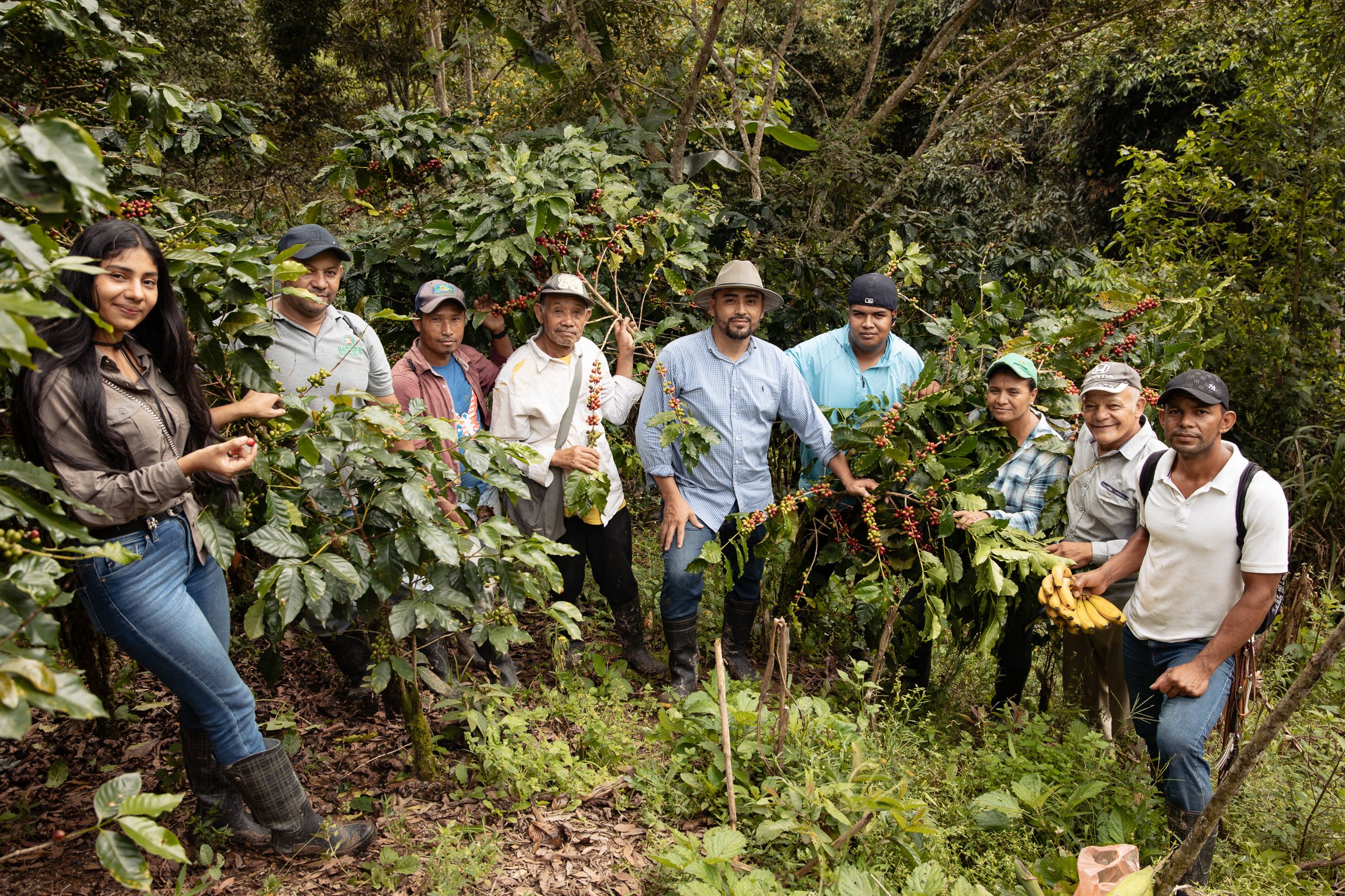
Our Farmers
Elevar’s producers live and work in the Agalta Tropical Region of Honduras
Over the past two decades, Honduras has vaulted into the top ten largest coffee exporters in the world. Elevar Coffee Organization emerged amid this growth and is currently ranked the highest quality specialty coffee of any organization in the tropical Agalta region.
Nestled beneath canopied tropical cloud forests throughout the Sierra de Agalta Mountain Range, Elevar’s sixty small-scale coffee farms benefit from attentive care of every tree in a region known for its fertile soils, diverse microclimates, heavy rains, and high altitude. Of the six coffee regions in Honduras, Agalta is distinguished as home to the first documentation of coffee cultivated in the country in 1835 and home to some of the largest protected cloud forests in Central America — Sierra de Agalta National Park, El Boquerón National Monument, La Muralla National Park, and Pico Pijol National Park — and part of the Río Plátano Biosphere Reserve, a UNESCO World Heritage Site.
Agalta’s vast forests, valleys, and watersheds host a range of endemic and endangered species such as the Honduran emerald hummingbird and the Agalta moss salamander as well as vulnerable species such as the three-wattled bell bird and the red-throated caracara. Shade grown crops such as coffee on small-scale farms can mimic existing cloud forest ecosystems and improve biodiversity and coffee quality. Elevar continues to strengthen our rainforest-friendly farms through research and investment in local communities, preserving and planting native shade trees, preventing over-fertilization, and providing producers with honey-water composting techniques, reforestation support, and education.
Elevar’s coffee farming community combines traditional knowledge passed down through generations of farming families with organizational support based on a more producer-driven versus hierarchical structure and current agricultural science approaches, practices, and challenges.
Farmer Profiles
Farmer: Joel
Nine years ago I bought an old farm and found the property abandoned and completely overgrown with dense vegetation. I thought the farm was lost. I grabbed my machete and began to trim back the thick weeds, when to my great surprise, I discovered acres of coffee trees! Coffee farming had been in my family since 1940 with my grandfather in San Francisco de la Paz, Olancho. In 1959, my father initiated some of the first cultivars with the variety Typica, known in Honduras as Indio. In 1998, my father lost the farm due to the catastrophe that Hurricane Mitch left in its wake. Since then I had dreamed of buying my own farm, and after saving for many years, that dream had finally become reality. So after I discovered coffee growing on my farm I named it La Bendición, The Blessing.
After nine years of hard work restoring the farm, I have expanded to 21 acres, doubled the number of trees with the Costa Rica 95 variety, and planted three additional varieties of coffee. I have diversified my coffee farm with different varieties of coffee, as well as avocado, lime, mandarin, and banana trees. I have experimented with coffee processing methods, including harvesting, resting, and de-pulping times and seen an increase in the quality. I dream of having my coffee placed among the best buyers and having a stable market.
Being a coffee producer enables me to create work opportunities for other people, to see the efforts of hard work reflected in a cup of coffee. I cherish watching the coffee fields transform when they are in full bloom, basking in the scent of honey from their flowers, and when the coffee cherries have ripened to maturity, experiencing the pleasure of drinking a cup of coffee from my own farm and be able to share it with others. My vision is to maintain the farm and expand, generate additional workers, make a positive impact for the community, positioning my coffee in the best stores, and be a fountain of inspiration for others.
Farm Name: La Bendición
Location: La Bellota, San Fransisco de la Paz, Olancho
Finca Size: 8.5 manzanas, 6 cultivated
Varieties: Costa Rica, Paraneima, Obata, Catuai
Average Plant Age: ranges 9/5/1 yrs
Processing: Washed
Drying: Solar
Elevation: 1580 meters
Farmer: Nelson
I was born during harvest in the coffee fields of Manto, the lush mountainous region of Olancho. Manto has historic and cultural significance because in 1835, it became the first place that coffee was planted in Honduras. Coffee is in my blood because my family has grown coffee here for generations. Passion is at the core of being a coffee producer because of the care involved. My recent training through Elevar has helped me see our coffee farm also as a business. We have adopted a new strategy that incorporates fundamentals such as shade regulation, fertilization, disease treatment, and drying, as well as budgeting. This means not only better quality and higher volume production, but improved profit margins. Just one branch applying the new cultivation techniques contains more cherries than an entire coffee plant just one year ago. Next year I will nearly double my production, from 35 to 60 quintales (1 quintal = 100 kgs), and my five year goal is to expand the finca and triple the number of plants using these new techniques.
We have become an example in my community because people see that coffee production can be financially profitable, ecologically sustainable, and offer a high quality of life. I am proud of the local jobs that my farm supports, employing 16 people during harvest, including 10 single mothers. I am thankful for my wife who attends to the work alongside me in the fields, for the wisdom of my parents who have dedicated their lives to the finca, and for the blessing of my two young children. We are all passionate about the expanding coffee industry in our beautiful Olancho.
Farm Name: El Zapotillo
Location: Las Uvas, Manto, Olancho
Finca Size: 2 manzanas
Varieties: Lempira
Number of Plants: 7000
Average Plant Age: 9 yrs
Processing: Washed
Drying: Solar
Elevation: 1312 meters



